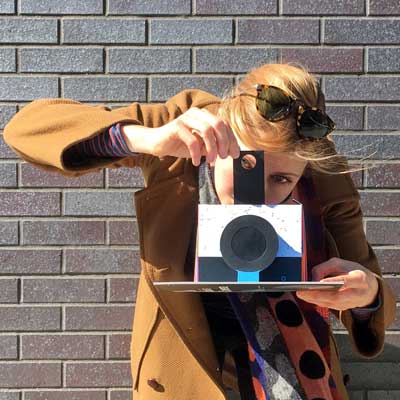Conference talk
Kelli Anderson:
Exploring type and culture by … misusing technology
During the pandemic, I’ve been busy recreating digital/technological processes with what has been on-hand: craft materials. I’m exploring how MetaFont reconceptualized the question of ‘what is a letter?’ in an animated paper pop-up. I’m working on an interactive modular typography device using a cardboard volvelle as “interface.” With colored gels, I’m demonstrating how Germany’s development of FE-Schrift for license plates sought to thwart human falsification—while communicating directly to the vision of OCR software. Additionally, I’ve made dozens of “risographed animations” to dramatize the minute morphological differences of letterforms in an impossibly noisey, shakey, and uncontrollable medium.
Understanding black-box digital processes by hand is undoubtedly absurd, but it also reacquaints us with the unique, embodied (and magical) way that humans process the world. With this work, I hope to provide an oblique lens to behold what we’ve created with our technology, so that we may engage more deeply with its philosophical implications and possibilities.
This talk will take place online, Friday, July 24, 2020, at 1:30pm (UTC-4), as part of the main Typographics conference schedule. Registration for the conference is free.
About Kelli Anderson

Kelli Anderson is a designer and paper engineer who pushes the materials of graphic design to their interactive extreme. Operating in the space between conceptual art, graphic design, and tech, her books have featured a working paper planetarium, a pop-up pinhole camera, and a paper record player. Whenever she can, she uses humble materials to showcase the surprising complexity and magic of the tangible, lo-fi world.
She is best known for her design, animation, and illustration work for NPR, The New Yorker, Wired, MoMA, the Exploratorium, and the New York Times, as well as her redesign of NYC brands such as Russ & Daughters and Momofuku. Her two experimental and interactive pop-up books: This Book is a Camera, which transforms into a pinhole camera, and This Book is a Planetarium, which houses a tiny planetarium and other contraptions, have been called “A marvel of paper engineering and imagination”— NY Times. Some of her other projects include Tinybop’s award-winning Human Body app and a counterfeited “utopian” newspaper distributed with The Yes Men. She teaches at the School for Poetic Computation and the New School in NYC and spends her free time making typography-based risograph animations at The Arm.


